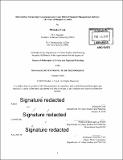| dc.contributor.advisor | Bishwapriya Sanyal. | en_US |
| dc.contributor.author | Cook, Mitchell J | en_US |
| dc.contributor.other | Massachusetts Institute of Technology. Department of Urban Studies and Planning. | en_US |
| dc.coverage.spatial | a-ii--- | en_US |
| dc.date.accessioned | 2018-05-23T16:31:08Z | |
| dc.date.available | 2018-05-23T16:31:08Z | |
| dc.date.copyright | 2018 | en_US |
| dc.date.issued | 2018 | en_US |
| dc.identifier.uri | http://hdl.handle.net/1721.1/115706 | |
| dc.description | Thesis: Ph. D. in Urban and Regional Planning, Massachusetts Institute of Technology, Department of Urban Studies and Planning, 2018. | en_US |
| dc.description | Cataloged from PDF version of thesis. | en_US |
| dc.description | Includes bibliographical references (pages 224-235). | en_US |
| dc.description.abstract | Decentralization policy in India has coalesced in recent years around interrelated concerns over the transparency of local government financial management and reporting systems and the capacity of urban local bodies to implement modern performance budgeting and accrual accounting structures. This dissertation examines the relationship between these policy concerns in the case of Bangalore and looks deeply into the role of information technology providers in advocating for greater local government financial transparency and accountability through financial management information system projects. Utilizing the concept of legitimacy games I find that mechanisms to support coordination in project implementation are subject to partially predictable but ultimately uncontrollable contingent interactions of norms, values, and structural arrangements that surround government financial management information systems. The latter are largely unstable over time given frequent changes to administrative personnel and the broader authorizing environment. Consequently, coordination within information technology project implementation spurs competition in legitimacy games between information technology subcontractors and systems. Under such conditions, forms of collective action around political accountability in urban governance spur a double movement of information democratization and information closure in entrepreneurial issue networks. As a result, the extent of effective local government financial transparency becomes increasingly dependent on the internal characteristics and relative power of information gatekeepers. The findings of the case study contribute to new knowledge on the relationship between information technology and local public financial management procedures and practices. The notion of legitimacy games draws stark contrast to conventional assumptions surrounding competition in public sector outsourcing arrangements, namely that it is driven by the desire for larger contracts so as to maximize profits or that it bids down prices in government outsourcing. The case illustrates how behavioral incentives to link financial management information systems to public transparency and accountability mechanisms emerge in highly localized confrontations not as a concerted response to national policy. The real effect of such technologies on local state capacity has been limited in the case of Bangalore. In order to achieve more transformational impact, policymakers, public managers, and technology providers must carefully consider how to handle large volumes of financial information corresponding to irregular transactions. | en_US |
| dc.description.statementofresponsibility | by Mitchell J. Cook. | en_US |
| dc.format.extent | 235 pages | en_US |
| dc.language.iso | eng | en_US |
| dc.publisher | Massachusetts Institute of Technology | en_US |
| dc.rights | MIT theses are protected by copyright. They may be viewed, downloaded, or printed from this source but further reproduction or distribution in any format is prohibited without written permission. | en_US |
| dc.rights.uri | http://dspace.mit.edu/handle/1721.1/7582 | en_US |
| dc.subject | Urban Studies and Planning. | en_US |
| dc.title | Information technology governance and local public financial management reform : the case of Bangalore, India | en_US |
| dc.type | Thesis | en_US |
| dc.description.degree | Ph. D. in Urban and Regional Planning | en_US |
| dc.contributor.department | Massachusetts Institute of Technology. Department of Urban Studies and Planning | |
| dc.identifier.oclc | 1036986082 | en_US |
